Here are several videos from the new Fluidity Audiobooks Youtube channel. Most of them are presentations that took place during Fluidity Forum.
The last one is an off-the-cuff video, sixteen minutes long, that I made while going on a walk, relating an anecdote of something that took place during Fluidity Forum. It was less scripted than what I usually do, so I’m curious to find out from you how well that worked. The rest of this newsletter is a transcript of it, for those who prefer reading over video.
I’m still working on a newsletter post of an event report and lessons learned. It was wildly successful and enjoys tremendous momentum. We’re planning another event in February. In the meantime, enjoy some of the recorded talks!
Transcript
I want to talk about one of the great advantages of Fluidity Forum-- one of the, really, biggest opportunities there-- and illustrate it with something that happened during the event itself.
I was put in mind of this by one of the talks. Jane Flowers gave a talk that referenced The Emperor's New Clothes, and I've been thinking about The Emperor's New Clothes ever since. It's a skeptics parable, you might say, a parable for those of us in the skeptic tribe.
But as I talk about this, I want you to know that everything I'm about to say is because I want to know you better. You're probably pretty far flung from me, along some dimension. And you might think, “oh, Matt's a skeptic. Well, he doesn't, you know, he's never gonna, you know, be receptive to anything that I have to bring, to contribute to Fluidity Forum.” That's not true. And this anecdote is going to illustrate that.
We had an Opening Ceremonies in which one of the parts of the ceremony was, each person brought a item that represented some kind of ideology or memeplex. Not everyone did. It was opt in. Those who had brought them were invited to- I asked them to present it to the group, say what it was, say what ideology or complex it represented. We wrote that on a little folded table tent card, and we set it on a sofa on the stage. So these objects would be considered, not guests of honor exactly, more like panelists. So it was considered your plus-one, so you can bring some kind of an ideology to the convention. I got a bunch of photos (I'd love to post them later) of these objects. It was like a little altar. Some people debated, "Okay, well, are these are these totems? Are these imagos? No, it's not quite imagos. Are they...” There were a couple of different terms people kicked around for exactly these words. [Edited to add: "fetish object" was another proposed term.]
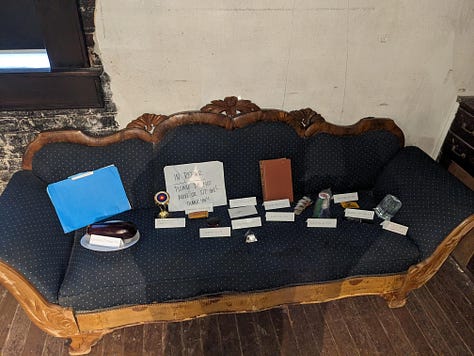

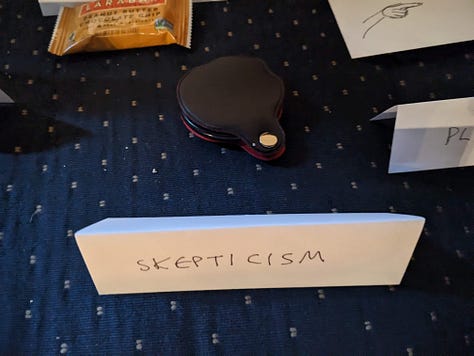
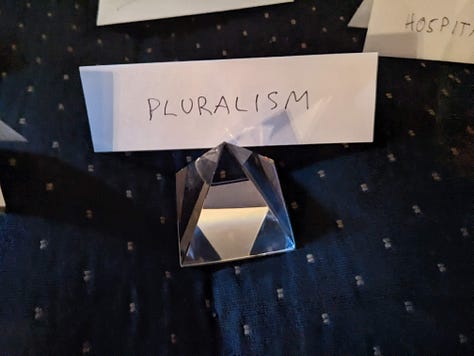

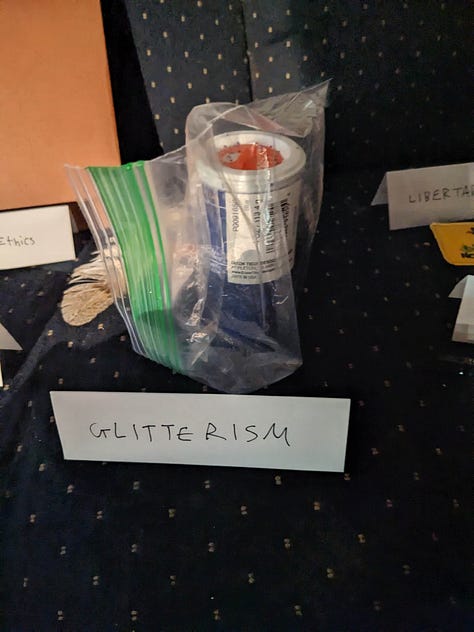
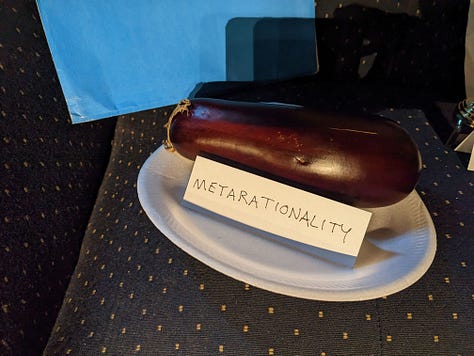


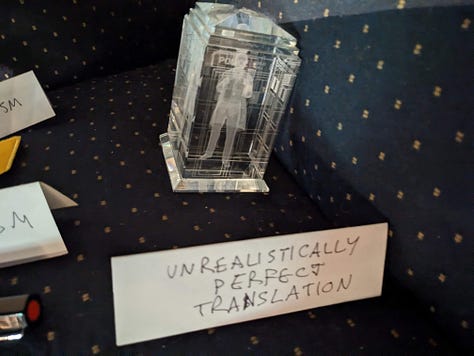
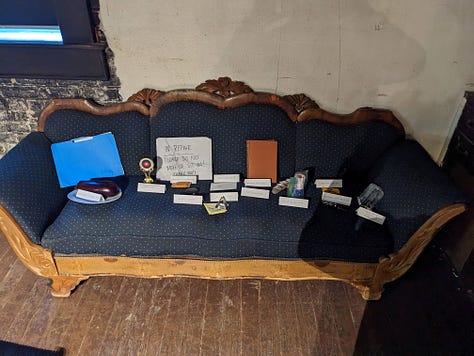

Anyway, after that part of opening ceremonies, another part of the ritual was that Duncan got up performed such an amazing piece of music. I was so moved. Just completely improvised. It was something that truly he does best. And then he asked all of us to breathe from our hands, and to breathe to that altar-- the altar that I just mentioned, full of these ritual objects.
And I remember thinking, I don't actually have a respiratory system in my hands. So he's referring to something! Now, you might again, be kicking in with "oh, well, Matt's just gonna completely reject anything that sounds like woo." And that's not what I'm doing. What I'm doing is, I want to do the actual thing. I don't want to do some other thing. And all I did was breathe. Like, I breathed, but I didn't breathe from my hands, because I don't know how to do that. Then I exhaled and I didn't know how to breathe to the stage with that sofa full of objects. Because there's something he's referring to, and I just want to know what it is, so that I can do it, so that we're all doing this thing together. Not because I'm just knee jerk rejecting.
This is leading to two principles that I got from Michael Ashcroft in his online course about Alexander Technique. It started off (honestly, the course is great, and this was actually my favorite thing I took from it, tons of good stuff, but this was my favorite thing) two principles for how to approach the course itself.
The first principle Michael Ashcroft proposed was this: that you don't immediately just knee jerk decide that, "you know what, this is a bunch of bullshit. And it's woo. And it's, uh, it's kind of out there. And it's not disprovable, and I, you know, like, this is nothing and it's not real, and I'm not really putting in, you know, the actual effort to do the thing." In other words, don't self sabotage with just immediately writing it off.
The second principle that he brought was, don't immediately assume that you know what he's saying.
You understand?
Because it's so difficult to describe internal subjective experiences, the internal subjective experiences could be expressed in language in a lot of different ways. Two people very frequently will be talking to each other and use the same language to mean two completely unrelated things. And they don't find out. Sometimes for years. I mean, I think that's a missed opportunity. They thought that they had a bond, a connection... "Who is Matt talking about when he says 'they'?" So many people I've known over the years, I can't even count them. They thought that wow, they were really close, they were really doing this thing together. And then only to find out with this sort of sense of shock and sadness, that they have never understood each other at all.
So this relates back to The Emperor's New Clothes. There's a different lesson to The Emperor's New Clothes that I think is commonly taken away from it. The obvious lesson, as it's considered the parable of the skeptics, is there's no such thing as invisible clothing, but people sure will be willing to believe anything that's obviously not true in order to appear wise. Up to a point, yeah, I mean, up to a point, that's certainly true in and of itself, as far as it goes. The vast majority of clothing is not invisible. And the vast majority of things that people consider to be wise or embodied or...
Sorry, there's a motorcycle. Did you just get that guy popping wheelies? Wow.
Actually, I did learn that from Alexander Technique. So that is one thing I got out of the course, which is that more mindful of the things around me. So if a whole bunch of motorcycles go by behind you, would you actually notice? And yeah, actually, I would. I would notice there's a massive number of motorcycles who are all popping wheelies behind me. I didn't... actually I still can't do Alexander Technique, so far as I can tell, because I still don't know what it is. And I told Michael Ashcroft this in a video call afterward. He found that feedback very helpful, because I could be very specific about, there are certain things he said that I honed in on. And so that was very fruitful. He said he was going to really redo his entire course, or most of it, based on that feedback.
But you see, that's going back to my point, which is that I could have just said, "Oh, yes, I definitely understand Alexander Technique." Oh, yes, that clothing is definitely real. I'm not saying the clothing isn't real. I'm saying if you can't see it, admit it.
If you can't see it, admit it.
I'm wise in many things, actually. There are many places in life in which I'm, actually... yeah, I am pretty wise. And there are others in which I'm just flat out not. And I would like to say so.
So I went up to Duncan after the opening ceremonies, and I was like, "Hey, could you actually tell me how to breathe from my hands or to the... from my crown or to my root? Or from the crown to the sofa? With the altar things on it? Or... what exactly is that?" This entire video is about that moment.
Now, it's a big missed opportunity that I didn't just stand up in the audience and say, in the middle of opening ceremonies, "can you tell us how to do that?"
And tell the whole group. Because Fluidity Forum cannot become a place where you show up and then people don't translate between their different languages. We don't translate between these languages at all. And so you're just sitting in the audience thinking, "I guess this place is clearly not for me. Otherwise, they would have told me what on earth they're talking about."
Let's say if... I'm gonna pick on Richard, if-- and he wouldn't do this, but suppose-- Richard were just to use a lot of economics jargon. I don't think he'd do that. He certainly wouldn't be averse to anybody being like, “hold up. I didn't get that. What is that economics jargon?” That's my point. It doesn't have to be like only the woo people have to translate for the non woo people.
What you do is, if someone says that they have invisible clothing, you ask to touch it. I think the things in this community are considered embodied, this scene tends to be really all about it. I'm not entirely sure. Usually, whenever somebody talks about something embodied or somatic, those are the places where I'm-- I'm not saying, "oh, that's bullshit." I'm saying "no, you probably got something, you're probably on to something and I want to know what it is."
I don't want to just pretend to know what it is, which I call PIMAN. PIMAN is P, I, M, A, N, and it stands for podcast interview mutual appreciation noises. And it goes like this. Mmmmmm. Mmmmmmmmmmmm. MMMMM. Mmmmmm. PIMAN, podcast interview mutual appreciation noises. And that is the death of epistemic norms in a community. Nobody... That's basically saying, "Oh, yes, I too can see the clothing," instead of just admitting that you can't and asking to touch it. I like a podcast interviewer who actually disambiguates. "Oh, wait a minute, when you say that, do you mean this? Or do you mean that?" Or just ask for clarification, just just admit when you don't know.
This is a vulnerable and unsafe thing to do. You know? You don't go around asking people to touch their clothing. For reasons that I hope are obvious, people often really don't like that. It's intimate and potentially vulnerable: what if, in point of fact, the clothing is not there?
Because a lot of people fool themselves. There's a lot of stuff that is considered wise that is, in fact, actually-- I'm sorry, it is, in fact, just bullshit. Mostly. But maybe you can tease out the kernel of truth, or the kernel of something that's useful and valuable.
But if we don't do that, then what is Fluidity Forum? I mean, it's-- I'm serious, if we don't do that, then why are we doing this? I know my passion in bringing together these things. I said, this is a bridge. We're bringing people to the Bridge State in order to enter a bridge ... state. Okay! So let's bridge!
And the way to bridge between different people's languagings is to ask questions like, "how do you figure?" Seriously, just say, "how do you figure?" You know? And if we ask, how do you figure, and we just go ahead and boldly hold people to-- you know what, you have to actually be able to back something up.
You don't even have to answer with words. That, by the way, is why Alexander Technique is taught with posture, because of the fact that the words are so difficult to convey the actual thing that you're you're doing. Posture actually does it. So they walk over to you, and literally touch your body and put you into a particular pose, and say, "there! That thing you're feeling right now. That's it!" So it doesn't have to be asking with words.
But the attitude has to be one of, "can I touch your clothes that you say are so great. I mean, I'd love to appreciate them!" That's what, as Jane flowers pointed out, well, clothing is for appreciating! If it's invisible, okay, well, that doesn't seem very useful, unless you can touch it. So maybe it's only visible in a particular part of the electromagnetic spectrum that some people can see. Fantastic. The rest of us could at least touch it and get the appreciation.
When I was at the Fluidity Forum organizers retreat with Duncan, we had a day in which we were really visualizing, visioning all kinds of stuff, and during it, some of us were, "Hey man, what's up? You seem a little a little distant." And he said, "Yeah, you know, you guys, I'm the only person here who isn't a science fiction reading nerd who, you know, talks about computer programming." And I'm like, "Ah, man! I'm the only person here who wasn't a ceremonial magician! I thought I was the odd man out!" We both thought that we were the odd man out. But I said, "you are key, you are key, you are key. If you weren't here, what would we even be doing? It's the very fact that it's difficult for us to bridge that gap that makes it so worth bridging. It's not just easy, comes naturally, it takes a bit of effort. That doesn't make it impossible. You're the key to this, you and people like you are the key to this, because I can easily try to attract people like me. I can attract people like me all day long."
This has been a rather lengthy video, but all of this is to say that it is possible for Fluidity Forum to, in my view, be a failure. I know that's something you really don't like to hear from somebody who is going to organize an event, but there exist ways to measure success. I don't think I listed that one in the ways that we measure success list on the Fluidity Forum website. You know, a lot of good stuff on there, on the ways to measure success. But I wish that I had talked about that. Instead, I talked about this on the page about vibes, in which I talked about how important it is for us to translate between each other's languagings. And really, I should have added that as a, you know, a brief item on the list of ways that we measure success, things that we are agreeing to.
So I wish, if I had it to do over again, I would have demonstrated, I think powerfully to the entire group, you stand up from the audience, you raise your hand and you say, "Could you go back a second? How do I actually breathe through my hands?" Let me know if you have any questions in the comments. And I'm very excited about where Fluidity Forum is going. There'll be more about that later. I just wanted to talk about this particular topic right now. I think that what we have here is a spectacular opportunity, and during Fluidity Forum, we demonstrate that. Thanks for listening to all this— this entire video. And I will talk to you soon.
-Matt A


